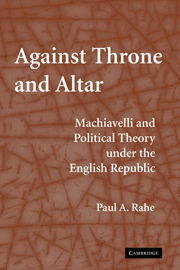Book contents
- Frontmatter
- Contents
- Acknowledgments
- Abbreviations and Brief Titles
- Introduction
- Prologue: Machiavelli in the English Revolution
- PART I MACHIAVELLI'S NEW REPUBLICANISM
- PART II REVOLUTIONARY ARISTOTELIANISM
- PART III MACHIAVELLIAN REPUBLICANISM ANGLICIZED
- 5 Marchamont Nedham and the Regicide Republic
- 6 Servant of the Rump
- 7 The Good Old Cause
- PART IV THOMAS HOBBES AND THE NEW REPUBLICANISM
- Epilogue
- Index
5 - Marchamont Nedham and the Regicide Republic
Published online by Cambridge University Press: 21 July 2009
- Frontmatter
- Contents
- Acknowledgments
- Abbreviations and Brief Titles
- Introduction
- Prologue: Machiavelli in the English Revolution
- PART I MACHIAVELLI'S NEW REPUBLICANISM
- PART II REVOLUTIONARY ARISTOTELIANISM
- PART III MACHIAVELLIAN REPUBLICANISM ANGLICIZED
- 5 Marchamont Nedham and the Regicide Republic
- 6 Servant of the Rump
- 7 The Good Old Cause
- PART IV THOMAS HOBBES AND THE NEW REPUBLICANISM
- Epilogue
- Index
Summary
The opinions of ordinary people matter. They have always mattered, even when dormant, and they always will. From time immemorial, the presumptions of ordinary folk have provided the underpinning for political regimes. In Nedham's day, however, popular opinion mattered as it had mattered at no time subsequent to the demise of the Roman Republic, for it had been thoroughly aroused from its torpor, and the people had been apprised of their power and instructed in its legitimacy. Thanks to movable type, the populace of England had become what it had never been in the past: a public – a wakeful community authorized to judge. The birth of the periodical press served to confirm and sustain a transformation that had for the most part already transpired.
To the Great Rebellion, the printing press was even more essential than it had been to the Reformation. The surviving English pamphlet literature of the period stretching from 1628 to 1660 is greater than that of the American and French revolutions put together. The weekly newsbook was an offspring of the pamphlet, distinguished from the diurnals that had been issued on occasion in the quite recent past by its character as a periodical. As such, it presupposed on the part of the people not only a right to be informed concerning matters of public policy but a continuing and unending desire to know.
- Type
- Chapter
- Information
- Against Throne and AltarMachiavelli and Political Theory Under the English Republic, pp. 179 - 196Publisher: Cambridge University PressPrint publication year: 2008



